“Where Is The Madness That You Promised Me?”: A Conversation With Caveh Zahedi
18.05.15
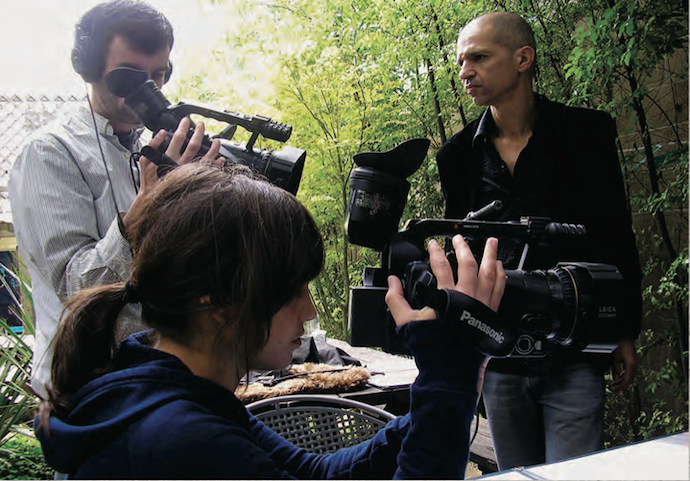
Before the internet made a social contract of documenting (and homogenizing) every waking moment of our lives, the Iranian-American filmmaker Caveh Zahedi filmed himself for one minute each day of the year 1999 in an attempt to prove the existence of God. For Zahedi, given the Bazinian notion that the film image is inherently a representation of reality, one can have faith that chance itself, engaged in the present tense, may form a type of narrative before our eyes—that randomness (a.k.a. God’s will) can be channeled through the ego of the artist. In The Bathtub of the World (2001) depicts Zahedi filming himself as he fights with his girlfriend, takes mushrooms on his birthday, tries to get a flock of pigeons out of his apartment, and films acquaintances who don’t want to be filmed—all while directly addressing the viewer. It’s hard to resist Zahedi’s apprehension and self-consciousness before the camera, his disinterest in moralizing and his stubbornness to see his projects through to the end—all in service of an eccentric quest to find meaning in the everyday.
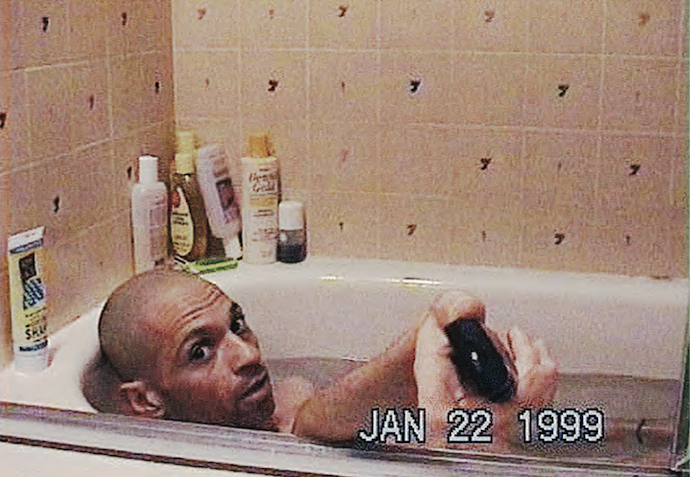
But let’s face it: failure is an inherently more interesting subject than success. Zahedi’s brand of first-person documentary always incorporates the possibility of fucking it all up, whether by attempting to get his father and cousin to take ecstasy with him (I Don’t Hate Las Vegas Anymore), to date a fellow art student (the “re-enactment” A Little Stiff), or to make a film commissioned by the Sharjah Biennial under the theme of art as a subversive act, without poking fun of Islam (The Sheik and I). One suspects that Zahedi already knew before attempting any of these projects that they wouldn’t pay off, but his work is characterized by confrontation, and a dialectical struggle to accept reality on its own terms. He always remains transparent in his methods and goals, even if it ultimately means admitting his own mistakes or the mistakes of others. His unceasing candor and vulnerability, whether in confessional, pedagogical, or psychotropic modes, has resulted in a fascinatingly prescient body of work, even as it is doomed to remain outside of the mainstream.
Zahedi is finally receiving his due in the aptly titled Digging My Own Grave, a 6-disc box set that contains all 5 of his features and over 30 short films that include video diaries, animation, making-of-featurettes and Q&A sessions. Perhaps the most valuable addition to the set is a 120-page booklet that includes ingenuous testimonials from friends like Lena Dunham and Alison Bechdel, former collaborators who describe their falling out with Zahedi, and a letter of recommendation from Jacques Derrida, all interspersed with sort of anecdotal autobiography which chronicles Zahedi’s careerlong struggle to merge the concerns of high art and literary modernism with commercial ventures. After attempts in college to make short adaptations of Goethe and T.S. Eliot, he went on to pitch projects based on Rimbaud and the life of Van Gogh that never took off. He is currently casting a project about the avant-garde filmmaker and artist Joseph Cornell, which, if it gets financed, will be his first narrative feature since 1991’s A Little Stiff.
Zahedi is currently a professor of Culture and Media at Eugene Lang College The New School For Liberal Arts. I spoke with him in the backyard of his Carroll Gardens apartment, where he lives with his wife and two children.
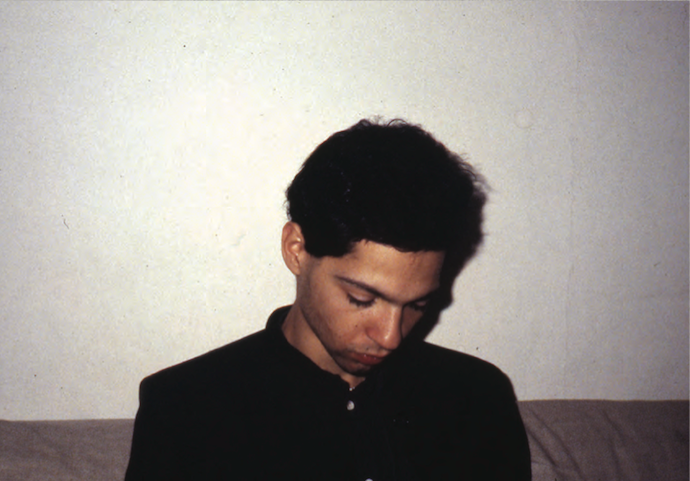
Fanzine: In the years since you started making films about yourself, the world has become a kind of democratic wasteland, with our everyday lives being documented in ways we are highly conscious of, as well as those that are hidden from us. How do you still find meaning in the everyday?
Caveh Zahedi: Gee, I mean, it’s a struggle. But I mean, it’s all we have—this fantasy. And [then] there’s the everyday. And I think that most of my life I’ve lived to and fro between fantasy and the everyday. But I do think that human suffering is the result of this discrepancy, between fantasy and the everyday. And the wider the discrepancy, the greater the human suffering. And so, for me, it’s just like, if I want to have any sort of peace—which I do—or to reduce the suffering, which I feel every day—it behooves me to reduce that disparity. And so I think it’s something that I can’t get away from. The everyday is just—we’re stuck with it.
FZ: So it’s about looking into reality face-on.
CZ: Yeah. I have a few friends who are making a film about Dr. John S. Sarno, who wrote a book about back pain. And he basically said if you read his book, your back pain would go away. I had a lot of back pain, and my friend said to try it, and it did go away. I mean, not forever, but to a remarkable degree. His thing is that most pain is psychosomatic, and that it has to do with the disparity between your ideas about things…[and] anger is the thing that happens in that disparity. The anger that this is not the way my fantasy wanted it to be. And most psychosomatic conditions are a result of repressed anger. There’s this perfectionism tied into that too, if your ideal is higher. Why did I bring that up just now?
FZ: The discrepancy between fantasy and reality and how that relates to your worldview.
CZ: Oh, yeah. Your body suffers, physically. Your body demands that you face the facts. I mean, I don’t want to face the facts. But my life, my body, constantly force me to. Does that answer your question?
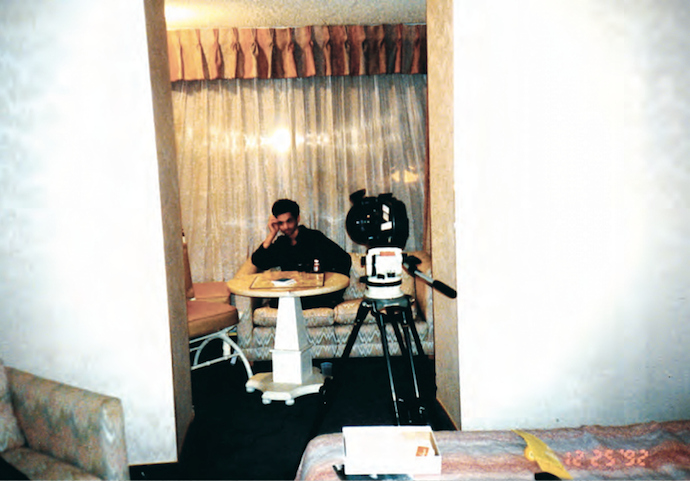
FZ: It does. I read your piece from last year about Lars von Trier’s Nymphomaniac, which you were disappointed with, because it seemed like his atheism had compromised his worldview—that von Trier couldn’t escape his own ego, nor the negation of everything he was trying to say. And there’s a belief among many cinephiles that modern independent filmmaking is in a rut—in the sense that there are so many young filmmakers who are making films, but have little to say. Do you believe that independent filmmaking is in a spiritual rut?
CZ: I mean, I think there’s a spiritual malaise in the world. Particularly in the Western World, with that sort of secular materialism–it hits a dead end. Our culture is the result of that dead end. I think there’s something obviously deeply problematic. And I think that all of these orthodoxies, like Orthodox Islam, are in their own way attempting to sort of deal with that malaise. I don’t think they’re a particularly constructive or progressive way. So, I think it’s general. What you said was interesting about independent film being in a rut–I wouldn’t say that young people don’t have that much to say. I think what they’re saying is just sort of–subtle, or they’re still searching for something. I mean, I’m still searching too. It’s not that I have a thesis to proclaim. But I know what you mean.
I personally am not satisfied by making films that resemble other films, including my own. And I think there are a lot of films that resemble other films. That’s really my main gripe with cinema, or what you’re calling the rut. But I think a lot of the films that are being made are really good, and they do have something to say. It’s just often like, incremental variations on other things. But that’s what art has always been—incremental variations on other things. I mean, what does a painter like [John] Constable have to say? It’s just a certain way of looking at light and color, really. But it can be very beautiful, and transcendental. I mean, I’m very impressed by the independent films that are being made. There are so many good ones. What’s frustrating is that there’s too many, and it’s hard to frame them—to stand out. But I’m usually not disappointed by films. I’m usually impressed by most of the films that I see, and I’m often like, wow.
FZ: You used to say that Breaking the Waves was the greatest movie ever made. Has there been any movie in the last decade that you really loved?
CZ: Boyhood. I mean, what I love about Boyhood is just that it’s qualitatively different than all the other movies. So like, it stands out. That’s sort of what I’m talking about—I love it when films do that. Or a film like Dogville, which is one of my favorite Von Trier films. It just stands out, like, [it’s] very innovative. That’s what I like. I like innovation.
FZ: You teach a course at the New School on modern independent cinema, where you’ve invited a number of young acclaimed filmmakers (Andrew Bujalski, Lena Dunham) to come and present their films. Do you find yourself in a mentoring capacity, or do you just want to keep up with what’s happening?
CZ: You know, I don’t think I’m really mentoring anybody. I wouldn’t mind, but no one’s really asked. I think I’m just interested in what’s going on. Some people have sought me out because they’re fans. But it’s always a very equal relationship.
FZ: Do you attend many film festivals or do you simply go to the movies a lot?
CZ: I mean, since I’ve had kids I really don’t go to movies a lot at all. I mean, I usually go to festivals if I’m invited. If I was single and young, or just not a parent, I would go every night to the movies and I would go to all the events and meet all the people. I think New York is this amazing place to do that, and I wish I was young and here instead of whatever I was doing.
[But] I read a lot, so I’m pretty aware of what’s going on. I mean I have this huge reading list of movies I want to see, much more than I can see. So I read about things that sound interesting and then I have friends that recommend things. But yeah, right now there are like 100 films that I’m eager to see. I can hopefully see one tonight if I’m not too tired.
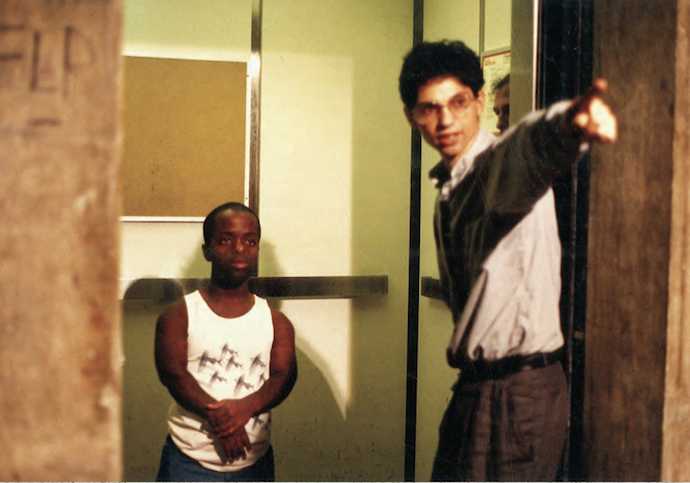
FZ: You won the first-ever Gotham Award for “Best Film Not Playing at a Theater Near You” in 2005. In that speech you spoke about empowering independent filmmakers to not wait around to get distribution, but to be resourceful and find their own means of distribution. How much do you think has changed since then?
CZ: Well, a lot. It just got a lot harder. I mean, everything’s changed. I do still think that the idea’s still true, I mean, filmmakers have to be resourceful. But I think we have to be even more resourceful than we had to be then. I mean, you have to not only make a great film, but you have to come up with a great ad campaign, at the level of like The Blair Witch Project. Something that really puts you over the top. I have not figured that out yet, but I spend a lot of time thinking about that now when I work on a film, how I’m going to get the word out. And I think I’ve been failing pretty miserably. I mean, that Getting Stoned With Caveh thing had like 500 hits, I think.
FZ: Why do you think that wasn’t successful? I remember it being featured on Fandor and Filmmaker Magazine.
CZ: I mean, I tried. Nobody else would write about it. I mean, maybe I didn’t try hard enough. I got other things going on. But I would have thought that it would do better. And that’s always the case. I always think, oh, this is gonna…and then it never does. I’m also allergic to carpetbombing of social media. I just think there’s something aesthetically…aversive, for me, to do that, and I feel like the films are trying to say something, and if your ad campaign says something very different than what the film is trying to say, then that doesn’t make sense to me. They have to be of a pair. Which is why the Blair Witch campaign was so beautiful. It wasn’t like, batting people over the head with it. It was actually letting the intrigue do its own work.
FZ: So the marketing campaign should ideally be an extension of the film itself.
CZ: It has to be, for it to like, break through. I remember the Blair Witch ad campaign more than the actual film. The best thing about Nymphomaniac was the ad campaign.
FZ: I wanted to ask about your education. There’s a story in the booklet about your Yale days, when you sabotaged a speech by Gen. William Westmoreland by projecting Super 8 footage of Vietnam war atrocities behind him, as a sort of guerilla art happening. Do you feel that the things that you studied and performed in those days were more or less important than your experience at UCLA’s film school later on?
CZ: I don’t think I learned much in film school. I think I learned everything as an undergrad. I mean, I mostly studied philosophy—Hegel, Nietzsche, Heidegger, Kierkegaard, Derrida, Deleuze. I think almost everything I do comes from that place, rather than a film place, per se. I’ve learned a lot about film over the years, but not from school. Just trying to make them, really.
FZ: You lived and worked in Paris after you graduated college. I wanted to know what attracted you to that place.
CZ: When I was a kid I went to a Swiss boarding school, so I knew French. I lived in France a little bit, intermittently, as a kid, so I always thought of myself as half-French or something. I spent enough time there to know what a film culture is. So I think when I started feeling frustrated by the lack of receptivity for my work in the states, I thought, oh, in France, it’ll be different. So there was this fantasy about how French would embrace me, which was not true. I also married a French woman. So it just made sense to go there for financial reasons and career reasons. That was all it was. I thought that would be the place for me.

FZ: I love your brief appearance in Citizen Ruth, and your famous scene in Waking Life. Have you considered getting back into acting?
CZ: I would, but I have no range as an actor. I can really only play one thing, and I do that OK. But I don’t think of myself as a good actor. If somebody would want me in their movie, usually I’ll say okay, unless it’s really time-consuming or a stupid script. But I don’t seek it out. It’s just too much work, and I’ve got other things I care about more.
FZ: You have an obsession with artists like Rimbaud, Van Gogh, James Joyce—all Western canon figures whom you discovered as an undergrad. You’ve had multiple attempts to make films about them throughout your career. Do you think without them you would have decided to become a filmmaker?
CZ: I went to a school called Van Gogh Elementary School, so I was aware of him early on. But Joyce I discovered freshman year in college, and probably most of the people whose work I love I discovered in college. I think great art inspired me to make films. And I have a dozen others up my sleeve. I mean, I’ve always loved biographies since I was a kid—that’s kind of my favorite genre. If I had money to do whatever I want, I would make biographies of great artists. Artist biopics.
FZ: Tell me about the Joseph Cornell project, The Sky is Blue Like an Orange, which details his relationship with Joyce Hunter.
CZ: Aside from the fact that I think it’s a “good story”, I guess I’m always trying to learn from these canonical authors. And I think when I discovered Cornell in college, I was very influenced by him. I started making collages and found footage films. He was a huge influence, but I also felt apprehended that it was the tip of the iceberg, that there was a lot more there to be gleaned than I had from my cursory immersion. So I always wanted to come back to it—that’s true of all these people, to go back and go deeper with them. I think that making a film about it is my way of doing that, just a way to go deeper and to learn more deeply what they have to teach. I think that Cornell has a lot to teach me in particular, maybe some of my areas of weakness that he’s strong in. Sort of the visual dimension, I really have not been practicing much. So there’s all that.
But I’ve also come from this experimental film background, kind of the same way that I’ve turned my back on politics in a certain way, at a certain point. Mostly out of frustration and despair, that it wasn’t taking me where I wanted to go, to popularity or acclaim. But there’s a deep love of experimental cinema that is buried under my hostility towards it. For me, it was an opportunity to bring that part of myself, which I’ve sort of not been really practicing or actualizing, into the picture. For me it’s a way to sort of integrate the history of experimental cinema with narrative cinema, and to me that’s very appealing on a healing level. I also feel like I understand experimental cinema very well, and most people don’t. And I also understand narrative cinema in a way to make it palatable, to bring it to people who can really appreciate it. I believe in art appreciation, or whatever. I like to bring great things to people that don’t know about it. I’ve liked it when I’ve discovered things, and I guess I want to share these passions. And Joyce has been a huge influence—for me he really broke open the mold of form.
FZ: Until now, you’ve mostly made films where you are the subject. I’m curious what another non-documentary feature by you would look like.
CZ: It would look nothing like my other films!
FZ: I wanted to ask about your changing view of psychedelic drugs. You said at the UnionDocs screening of Getting Stoned With Caveh that they aren’t really your thing anymore.
CZ: I wouldn’t say they don’t really do it for me anymore. [But] at a certain point…I used to believe that they were profoundly transformative, that they were sort of like, “the way.” And I don’t really think that anymore. You know, there’s that Zen thing about taking water, carrying wood. You know what I’m talking about? Basically, you’re supposed to practice the ordinary—just carrying wood, or whatever. Chopping wood, carrying water, maybe that’s what it is?
But it’s kind of the opposite of transcendentalism. Weirdly enough, Zen is very anti-transcendence. Not that I’m big on Zen, but I appreciate this concept. Some people use the phrase “doing the laundry”—I think it was Jack Kornfield. You know, you can do five grams of mushrooms, but then you come down and you still have to do the laundry. Especially if you threw up. So that’s where we live, you know? I mean, I like ecstasy. The ecstatic experience is dear to me, and I think I need a certain amount of it. You know that Magnetic Fields song…
FZ: “Take Ecstasy With Me?”
CZ: Is that what it is? The one—no, it’s “No One Will Ever Love You.” And it’s like, “Where is the madness that you promised me…”? I think that we all need a certain amount of madness. And I think drugs are actually great for that. But at the end of the day, you still have to have that other thing. So, I think I was like, OK, this is great, and I think it’s important. I really think it’s, like, really important, and I’m all for it. But what I needed to practice was doing the laundry, and not resenting it. For me, I have a tendency to escape towards visions of grandeur–I have a grandiosity problem. Just like, how can I be happy making breakfast, making breakfast for the kids. To not have things be at a fever pitch all the time. That’s the struggle that I’m trying to practice. So at a certain point, psychedelics are not what I really need to be focusing on. But I still love them. They’re great. And I do smoke quite a bit of pot.
FZ: At the end of The World is a Classroom, you tell your class at the SF Art Institute that documentary filmmaking is about “what [reality] actually is, not what you think it should be.” What do you think is the greatest impediment to that?
CZ: Imagination. We tend to think in terms of what’s been done, and we tend to be mimetic animals. So I think, you know, most people when they make documentaries, they’re imitative, and derivative. I think that thinking outside the box–that’s why I like drugs. Because it really [takes you outside]. At least, for me, it does. I just think it’s a failure of the imagination. Whenever a film doesn’t do that, it’s always such a breath of fresh air.